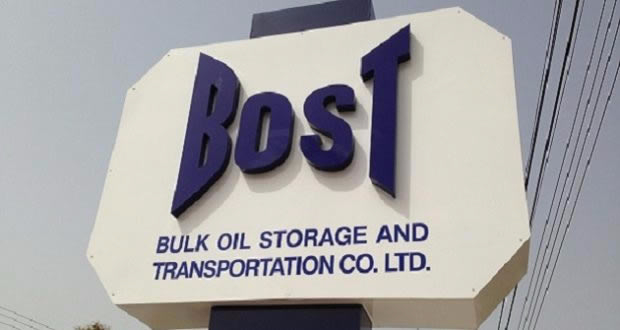The Board Chairman of the Bulk Oil Storage and Transportation (BOST), Mr. Ekow Hackman has said that the progress the company has made over the past few years which has transformed it from a heavily indebted company owing more than $624 million as at January 2017 to one with debts of less than $30 million as at the end of 2021.
He said the compnay has restored the business model on which the company was established, to have a number of operational fuel depots placed in strategic parts of the country linked by a network of pipelines and barges to enable secure and cost-effective delivery of fuel products to consumers all over the country.
Over the past decade , he said, this network had entered a state of disrepair largely because of a lack of investment in its maintenance.
BOST’s utilization of its assets reached a low of 34 percent in 2017. Honorable Ministers, through the diligent efforts of management supported by a well-oriented workforce this figure had risen to 95 percent as at the end of 2021 and is due to climb higher with the completion of remaining works on our critical infrastructure this year, Mr Hackman stated in the 2021 annual report.
“The restoration of part of the lost value of the BOST Margin by Government in June 2021 has brought an element of financial stability to the company. This levy on the petroleum price has ensured that BOST can repair and maintain facilities in parts of the country such as Bolgatanga, Buipe, Savelugu and Akosombo, areas shunned by the private sector. During the year 2021, BOST was able to regain the confidence of the financial community with banks which had previously closed their doors to us now welcoming us with credit lines on more favourable terms, to enable us to bring in larger volumes of fuel products and to trade profitably as a result.
“The transformation of the company’s infrastructure as well as its commercial operations have been accompanied by a strong emphasis on governance and compliance. To this end, the board approved fifteen new corporate policies to regulate the work of the various departments. It is instructive to note that most of these policies, where they did exist, were only in draft and could not be used as benchmarks for the conduct of staff and management. Honorable Ministers, the drive to inculcate a culture of good corporate governance has not stopped at the staff and management level.
“The Board has established a Board Charter to guide its work as well as charters for its individual committees. In line with international best practice, we also introduced a Risk Committee which oversees the activities of the new Risk Unit introduced by management. This initiative was seen as indispensable even before these increasingly turbulent times which has led to developments such as the Covid-19 Pandemic and the Russia-Ukraine War.”
By Laud Nartey|3news.com|Ghana


